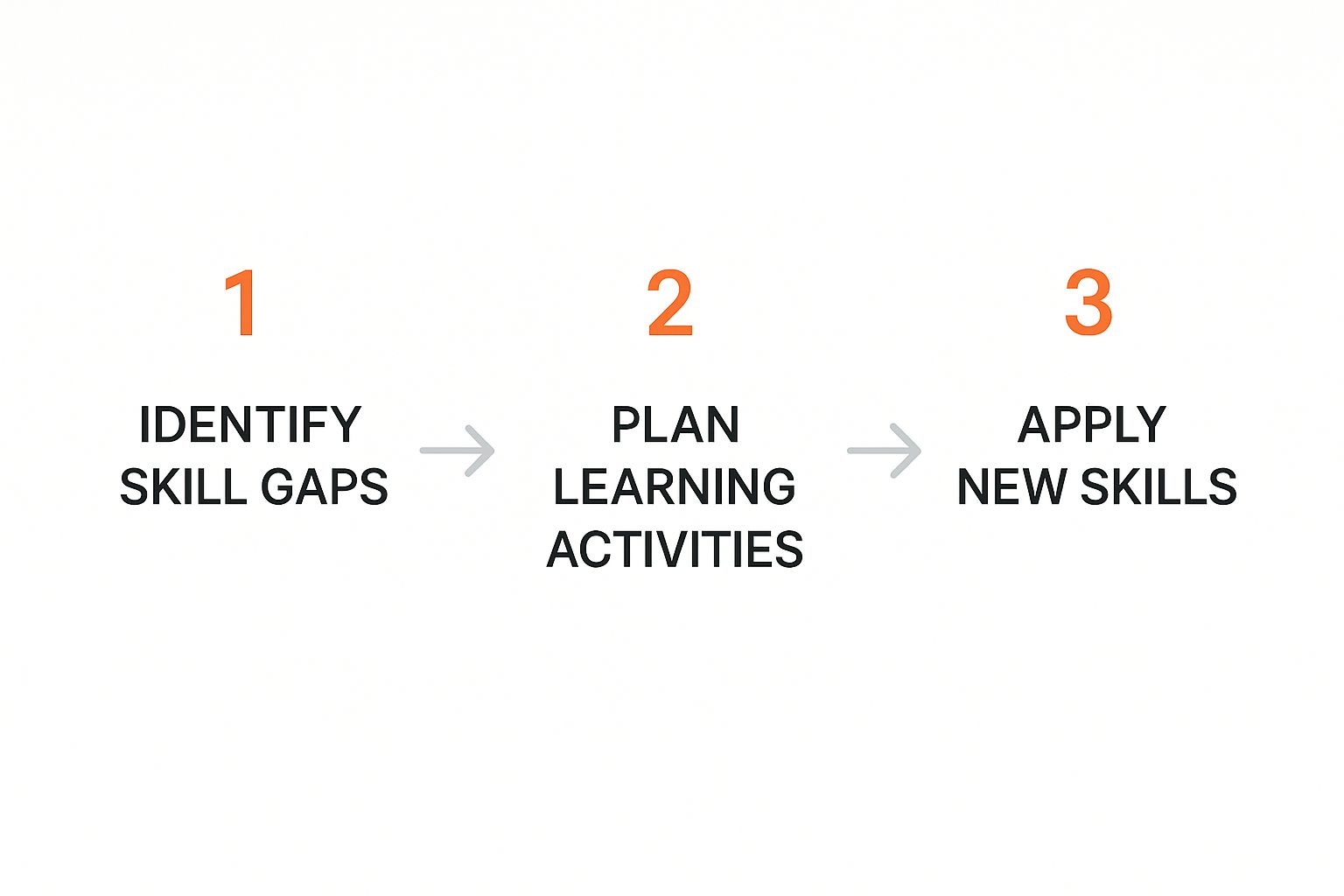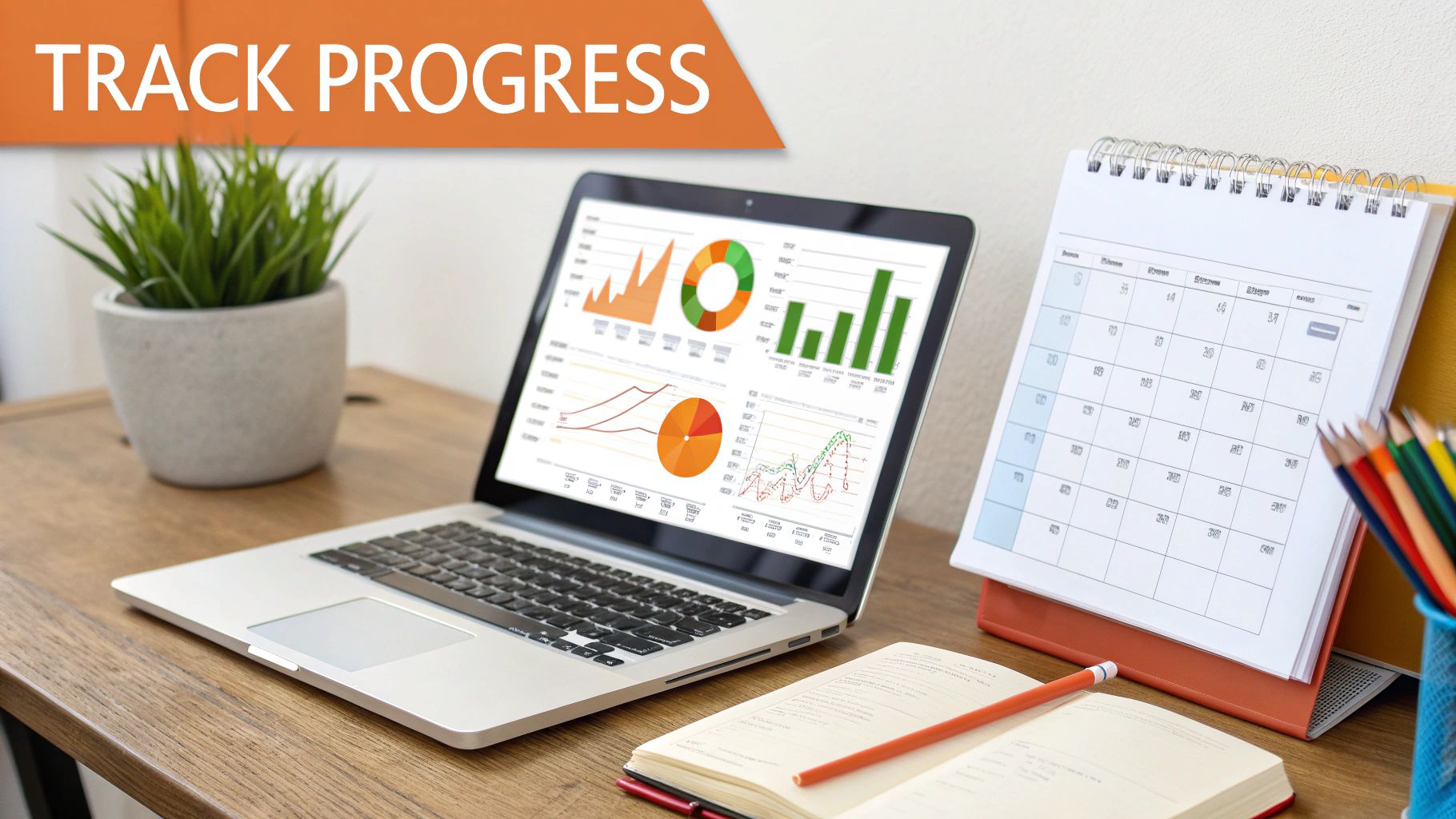A career development plan is more than just a list of goals; it's your personal blueprint for the future. It maps out where you want to go professionally and, just as importantly, how you're going to get there. This isn't about chasing the next promotion blindly. It's about consciously building a career that genuinely aligns with what you value and where you see yourself long-term.
Why Your Career Needs a Development Plan

Let's be frank: great careers don't happen by accident. They are built, one intentional decision at a time. The most successful professionals I know all use some form of a career development plan to guide their journey. It's the tool that turns vague wishes into a concrete, actionable strategy.
Without this personal roadmap, it's easy to drift, simply reacting to whatever opportunity comes along instead of creating the ones you truly want. It’s the difference between being a passenger and getting behind the wheel of your own career.
More Than Just a Document on a Shelf
Forget the old idea of a plan as some stuffy document you write once and then bury in a desk drawer. Your career plan should be a living, breathing strategy. It's a commitment you make to yourself for ongoing learning and adapting to a professional world that never stands still.
Taking the time to build this plan pays off in several powerful ways:
- Clarity and Focus: The process forces you to get crystal clear on what success actually looks like for you, separate from anyone else's expectations.
- Unwavering Motivation: When you break down a huge, intimidating goal into smaller, manageable steps, you create a constant source of motivation and a real sense of progress.
- Deeper Job Satisfaction: Actively connecting your day-to-day work with your bigger ambitions makes your professional life feel far more meaningful.
- Career Resilience: A good plan prepares you for the inevitable—industry shifts, economic downturns, and unexpected career pivots. You'll be ready to navigate them with confidence.
A major reason people become unhappy at work is a feeling of stagnation. In fact, one study found that 63% of employees who quit did so because they saw no opportunities for advancement.
The Real-World Impact on Your Future
The effort you invest in planning directly impacts your professional growth and marketability. Look at a country like Denmark, for example, which saw a high employment rate of 77.8% in late 2020. This is partly because their workforce is highly attuned to continuous skill development to meet industry demands. It’s a perfect illustration of how strategic planning keeps you relevant and competitive. You can explore these employment trends further on Trading Economics.
Ultimately, a well-thought-out plan gives you the power to write your own professional story. It ensures you're always moving toward a future you've consciously designed for yourself.
Start With an Honest Self-Assessment

Before you can map out where you’re going, you need a crystal-clear picture of where you stand right now. The bedrock of any meaningful career development plan is an honest, unflinching look in the mirror. This isn't just about daydreaming about fancy job titles; it's about digging deep to connect your professional goals with what truly makes you tick.
A fantastic tool I often recommend clients use is a personal SWOT analysis. You might have seen this used for business strategy, but turning that lens on yourself is incredibly powerful. It gives you a structured way to organise your thoughts and get a realistic view of your professional world.
Your Personal SWOT Analysis
Think of this as a practical exercise, not just theory. It’s about turning those fuzzy feelings about your career into concrete, actionable information. Find a quiet moment and be brutally honest with yourself.
- Strengths: What are your superpowers? This covers everything from hard skills, like being a wizard with Python, to soft skills, like being a natural-born leader or an empathetic communicator.
- Weaknesses: Where are your growth areas? What feedback keeps popping up in performance reviews? Maybe it’s a crippling fear of public speaking or a gap in your knowledge of a specific project management tool.
- Opportunities: What's happening out there that you can jump on? This could be a rising industry trend, a new technology gaining traction, or a surge in demand for a skill you already have.
- Threats: What external roadblocks could get in your way? Think about automation in your field, a flood of new talent increasing competition, or even economic uncertainty.
Let’s take a junior software developer as an example. Their strength might be a solid grasp of Python. Their weakness? A lack of hands-on cloud computing experience. They see a huge opportunity in the growing demand for AI specialists, but also a threat from the blistering pace of tech advancements that could make their current skills obsolete. See how this simple exercise already starts pointing towards clear development goals?
Looking Beyond Skills to Your Core Values
A great career is about more than just your job description; it’s about your why. Your core values are the fundamental principles that guide your choices and define what "success" truly means to you. A six-figure salary is meaningless if it forces you to sacrifice something you cherish, like work-life balance or creative freedom.
To get to the heart of your values, ask yourself:
- When did you feel most fulfilled at work? What was the situation?
- What kind of company culture allows you to do your best work?
- What are you willing to compromise on for a job? What’s completely non-negotiable?
Aligning your career trajectory with your core values is the secret to long-term professional happiness. It's not just a nice idea; a 2021 study found that lack of growth opportunities was the number one reason 63% of employees handed in their notice.
This alignment stops you from chasing shiny objects that look impressive on a CV but leave you feeling drained and uninspired. For anyone adjusting to a new professional setting, like moving to a new country, this self-knowledge is even more crucial. Understanding the local professional etiquette is just as important as knowing your own drivers. To help with that, you can master the German work culture with our comprehensive guide.
Armed with this self-awareness and cultural insight, you’ll have a solid foundation for building a truly effective career plan.
Right, you’ve got your big-picture goals locked in. What comes next is the real work: figuring out how to get from where you are today to where you want to be. This is all about building a bridge between your current abilities and the skills your dream job demands.
Think of yourself as a detective. Your mission is to conduct a frank audit of your own skill set and compare it against the requirements of your target roles. And don't just look at today's job descriptions—peek into the future. What will be in high demand in the next 2-3 years?
This part of the process turns a lofty ambition into a concrete learning roadmap. I always tell people to start by dissecting job ads for the roles they're aiming for. Look for patterns. What software, methodologies, or even soft skills pop up again and again? These recurring keywords are your North Star for development.

The image above really nails this cycle. You spot what you need to learn, you make a plan to learn it, and then you put those new skills into practice. This, in turn, helps you see the next area for growth. It’s a continuous loop of improvement.
Choosing Your Upskilling Pathway
Once you’ve identified the "what," you need to decide on the "how." How are you actually going to acquire these skills? Today, we're spoiled for choice, and each path has its own pros and cons. Your decision will likely come down to a mix of your budget, your schedule, and how you personally learn best.
Choosing the right method is a critical step in your career development plan. The table below breaks down the most common options to help you find the best fit.
Choosing Your Upskilling Pathway
| Development Method | Best For | Typical Cost | Time Commitment |
|---|---|---|---|
| Formal Education | Deep, foundational knowledge and recognised credentials (degrees, diplomas). | High (€10,000+) | High (1-4 years, often full-time). |
| Certifications | Proving specific, in-demand expertise quickly (e.g., PMP, AWS). | Medium (€500 – €5,000) | Medium (Weeks to months of focused study). |
| Online Courses | Flexible, self-paced learning on a huge variety of topics. | Low (€10 – €200 per course) | Low to Medium (Can be done on your own schedule). |
| Vocational Training | Hands-on, practical skills for specific trades or job functions. | Varies Widely | Varies (Can range from short workshops to multi-year apprenticeships). |
Each of these pathways offers a different kind of value. There’s no single "best" option—only the one that’s best for your specific plan and circumstances.
One of the biggest mindset shifts I see in successful professionals is realising that upskilling isn’t a one-time fix. It’s an ongoing commitment. The people who get ahead are the ones who embrace lifelong learning as part of their career.
This isn’t just a personal philosophy; it’s an economic reality. Look at the trends. In Denmark, for example, the workforce is on track to become much more qualified by 2025. The share of workers with high-level qualifications is projected to climb to 49%, largely because younger generations are investing more time in education to sharpen their skills and secure better jobs. You can dive deeper into these trends in the Cedefop skills forecast.
Turning Your Learning into Tangible Rewards
Here’s the part that really matters: new skills and qualifications have a direct impact on your earning potential. As you build expertise in areas that companies are desperate for, your value in the job market goes up. This gives you serious leverage when it's time to talk about compensation.
It's one thing to master a new competency, but it's another to make sure you're paid fairly for it. For anyone working in the German market, knowing how to articulate the value of your new skills is crucial. If you're levelling up your qualifications, you’ll want to check out our guide on how to approach salary negotiation in Germany.
A truly effective career development plan doesn't just build skills—it positions you to capitalise on them.
Build Your Personal Action Plan

An idea without a plan is just a wish. This is the tactical phase, where we get down to brass tacks and turn your career strategy into a concrete roadmap for success. You’ve defined your goals and identified the skills you need—now it’s time to translate those insights into a series of small, manageable actions with realistic deadlines.
This is arguably the most critical part of your career development plan because it dictates what you will actually do every week and month. The trick is to break down your big, ambitious goals—like "become a team lead"—into bite-sized, achievable steps. This approach makes progress feel real and helps you weave development into your regular routine without getting overwhelmed.
From Goals to Daily Actions
Let's get practical. Say your long-term goal is to transition into a data analyst role within the next 18 months. That's a huge objective, and staring at it can feel paralysing. The key is to slice it into quarterly and monthly milestones.
Here’s how that might look:
- Quarter 1 Goal: Gain foundational proficiency in SQL.
- Month 1: Complete an introductory SQL online course (e.g., an 8-hour total commitment).
- Month 2: Practice solving one SQL problem on a coding platform, three times a week.
- Month 3: Build a small personal project using a public dataset to showcase your new skills.
Suddenly, that vague ambition transforms into a clear, actionable to-do list. Every task you tick off provides a small win and a hit of motivation, fuelling your desire to keep going.
A common pitfall I see is people creating plans that are far too aggressive. The goal here is consistent progress, not burnout. Your action plan should energise you, not drain you. If you find yourself constantly missing your self-imposed deadlines, it's a clear signal to adjust the plan, not abandon your goal.
Expanding Your Influence and Opportunities
Of course, technical skills are only one piece of the puzzle. A truly effective action plan must also include steps for strategic networking and finding on-the-job growth opportunities. This is how you make your progress visible and start opening doors that would otherwise remain firmly shut.
Consider adding these types of actions to your plan:
- Mentorship: Identify three potential mentors in your target field and reach out to one per month for a quick informational chat.
- Networking: Commit to attending one industry-relevant webinar or local meetup each quarter.
- On-the-Job Projects: Proactively ask your manager if you can assist with a project that uses a skill you're trying to build.
This proactive pursuit of opportunities is the hallmark of a robust career plan. It’s also where you can tap into external support. For example, in 2024, the Danish government allocated a massive EUR 40 million to strengthen vocational education, especially in green technologies and other critical sectors. Discover more about Denmark's investment in workforce development and how it supports career growth.
Likewise, if your career path involves moving to a new country, your action plan must include understanding the local job market. Job search strategies can vary wildly from one country to another. For anyone looking at that specific path, our guide on how to find work in Germany is an incredibly useful resource. Think of this action plan as a living, breathing document—it's the engine driving your consistent, meaningful progress.
Review and Adapt Your Career Plan
A career development plan isn’t something you create once, print out, and tuck away in a drawer. If you do that, it's just a wish list. The real magic happens when you treat it less like a fixed road map and more like a GPS navigation system. It should constantly be recalculating your route based on new information, unexpected roadblocks, and even exciting new destinations you discover along the way.
A plan that can't evolve with you and your career is essentially useless. Building in a regular habit of reviewing and adjusting your plan is what makes it a powerful, living guide for your professional journey. It’s what keeps you in the driver’s seat.
Establishing a Rhythm for Review
Let's be honest, without a set schedule, life gets in the way. Your career plan will gather dust if you don't intentionally make time for it. I’ve found that a simple, two-part review schedule works best for keeping plans relevant without feeling like a chore.
- Quarterly Check-ins: Block out an hour on your calendar every three months. This is your dedicated time to look at the bigger picture and measure your progress against those key milestones you set.
- Monthly Quick Scans: At the beginning of each month, take just 15-20 minutes to glance at your immediate action items. Are you on track for the quarter? Do you need to shift a few things around?
This approach breaks down what could be an overwhelming annual task into small, manageable check-ins. It keeps your goals top-of-mind, making them a natural part of your professional routine.
What to Assess During Your Review
When you sit down for your quarterly review, your goal isn't just to tick boxes. You need to dig a little deeper and ask some honest questions about how things are really going.
The most important question you can ask yourself isn't "Did I do the thing I said I would do?" It's "Is this still the right thing for me to be doing?" Answering that honestly can save you from wasting months chasing a goal that no longer fits.
I recommend using a simple framework to guide your reflection:
- Celebrate Your Wins: What did you accomplish? You have to acknowledge every single win, big or small. Finishing an online course, having a tough conversation with your manager, or even just updating your LinkedIn profile—it all counts. This is what builds momentum.
- Analyse the Roadblocks: Where did you get stuck? Be brutally honest with yourself here. Did a goal turn out to be way more ambitious than you thought? Are you missing a key skill or resource to move forward? Identifying the friction point is the first step to fixing it.
- Re-evaluate Your Priorities: Has your world changed in the last three months? Maybe you were assigned to a new, exciting project at work, or perhaps there's been a major shift in your industry. Your personal life matters, too. These changes absolutely impact your career goals.
- Look for New Opportunities: What new doors have opened that weren't there before? Keep your eyes peeled for emerging trends, new technologies, or internal company projects that could align perfectly with where you want to go.
By following this kind of structured review, your career plan transforms from a static to-do list into a dynamic, active strategy. It gives you the power to adapt to the unexpected twists and turns, making sure every step you take is a deliberate move toward the future you’re consciously building for yourself.
Your Career Development Questions Answered
Even the most thoughtfully constructed career development plan will run into questions and the occasional curveball. That’s perfectly normal. Think of your plan less as a rigid contract and more as a dynamic roadmap, built to adapt as you and your career evolve.
Let's tackle some of the most common questions I hear from people trying to manage their professional growth.
How Often Should I Update My Career Plan?
This is a great question, and the answer isn't "constantly." Your career plan should be a living document, but you don't need to obsess over it daily.
I find a good rhythm is a major, deep-dive review once or twice a year. This is your time to step back, look at the big picture, and ask those fundamental questions about your long-term direction and overall satisfaction.
For the smaller stuff—the specific action items and short-term goals—a quicker check-in every month or quarter works beautifully. These are your moments to track progress, celebrate small wins, and adjust to any new opportunities or minor roadblocks that have popped up.
A fantastic rule of thumb is to pull out your plan whenever something significant changes in your professional life. Land a new job? Get a new boss? Finish a massive project? These are all perfect triggers to review your plan and see how the new reality shapes your path forward.
This cadence keeps your plan relevant without becoming a burden.
What If My Career Goals Change Completely?
First of all, relax. This isn’t a failure—it’s a sign of growth. It’s completely normal for your ambitions to shift, sometimes quite dramatically, as you learn more about yourself and the working world.
This is precisely why we build flexible plans in the first place. When you feel a major pivot coming on, don't just toss your old plan in the bin. Instead, use it as a learning tool.
Your first move should be to return to the self-assessment phase. What did you learn from your previous goals? Take the time to reconnect with your core values, your real interests, and what you now want from your career. All that initial work wasn't for nothing; the self-awareness you gained is a powerful asset that gives you a much stronger foundation for charting your new course.
How Do I Discuss My Plan With My Manager?
Talking to your manager about your career goals can feel a bit daunting, but this single conversation can turn them into your biggest champion. The secret is to frame it as a win-win.
Don't spring it on them in a regular team meeting. Schedule a specific time to talk. When you do, present your plan as a proactive way you're looking to add more value to the team and the company.
Instead of leading with what you want, focus on the skills you aim to build and how those skills directly support the team's objectives.
For instance, rather than saying, "I want to get promoted," try something like: "I'm really focused on strengthening my project management skills. I think this could help us deliver our upcoming projects more efficiently and hit our Q4 targets."
This approach shows initiative and frames your manager as a partner in your development, not just a gatekeeper for promotions. It helps them see where you can contribute more and actively look for opportunities for you. In Germany, for example, showing this kind of initiative is highly valued. Preparing for common German interview questions and answers can give you great insight into how to frame these career ambitions effectively. This small shift in communication can make all the difference.
Ready to get expert guidance on your own career development plan? With iknowly, you can connect with verified professionals from leading German companies for personalised 1:1 video consultations. Get practical insights on everything from CV enhancements to long-term career strategy. Book a session and start building your future today.

Leave a Reply